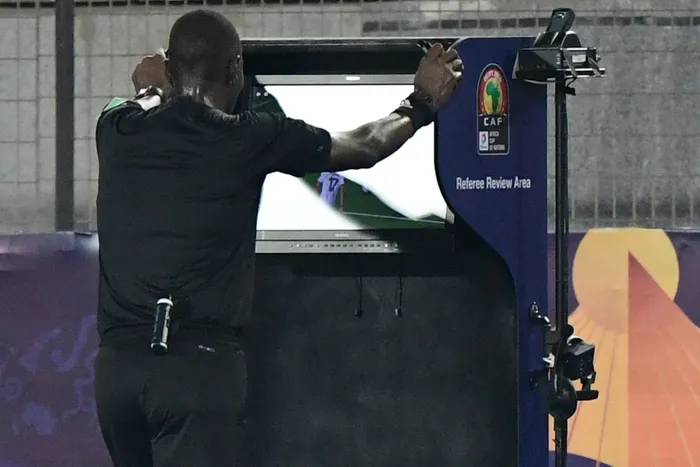
VAR gets closer .
Image: Javier Soriano/AFP
South Africa is set to revolutionise its football officiating with a significant investment in Video Assistant Referee (VAR) technology.
The Department of Sport, Arts and Culture has allocated R82 million to procure and implement VAR systems across the country's football infrastructure.
This move aims to enhance the accuracy and fairness of officiating in domestic competitions, aligning South Africa with global standards in sports technology.
According to The International Football Association Board (IFAB), VAR is a system designed to assist referees in making more accurate decisions during matches by reviewing specific incidents using video footage. It is utilised to evaluate four key match-changing situations:
Goals and potential offside offences
Penalty decisions
Direct red card incidents
Cases of mistaken identity in awarding cards
The system operates through a network of cameras positioned around the stadium, capturing multiple angles of the game.
These feeds are transmitted to a centralised video operation room, where a team of referees, including the Video Assistant Referee (VAR) and Assistant VARs, analyse the footage to assist the on-field referee in making informed decisions.
According to Inside Fifa, a comprehensive VAR setup typically includes:
Multiple high-definition cameras: Strategically placed around the stadium to capture various angles of the match.
Video operation room: Equipped with monitors and communication tools for the VAR team to review footage and communicate with on-field referees.
Communication systems: Ensuring seamless interaction between the VAR team and the on-field referees.
Software tools: Assisting in analysing and reviewing specific incidents, such as offside lines and ball trajectories.
IFAB outlines two VAR setups:
Full VAR systems: Utilise at least four cameras, with the possibility of adding more, to provide comprehensive coverage.
VAR Light: A more cost-effective option with fewer cameras, suitable for leagues or competitions with budget constraints.
According to the DSAC, this funding will be utilised for various aspects of the VAR project, including:
Development of a comprehensive project plan: To outline the implementation strategy and timeline for VAR integration.
Training programs for referees and officials: To ensure that match officials are adequately prepared to operate the VAR system effectively.
Procurement of VAR technology: Acquiring the necessary hardware and software to support VAR operations.
Stadium assessments and upgrades: Evaluating and enhancing stadium infrastructure to accommodate VAR requirements.
Establishment of a VAR Training Centre: Creating a dedicated facility for the development and certification of VAR officials.
Additionally, a portion of the budget will be allocated to improving stadium connectivity, not only to support VAR operations but also to enhance overall stadium safety and communication systems.
South Africa is following a global wave of tech-driven officiating. In the Premier League, semi-automated offside technology uses AI to reduce decision times, while leagues like the Bundesliga and Serie A employ sophisticated camera networks to monitor every angle of play.
By adopting VAR, South Africa is not only aligning with global standards but also positioning itself as a leader in sports innovation on the continent.
The DSAC, together with the South African Football Association (SAFA) and the Premier Soccer League (PSL), envisions a future where technology and human skill coalesce to deliver fairer, faster, and more transparent football.
Beyond improving refereeing, this investment signals the country’s commitment to integrating advanced technology into national sports infrastructure, setting a benchmark for innovation across African football.
